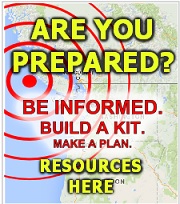
|
Wilkes East resident, Gail Anderson (with husband, Andy) conducts a video chat with her great-granddaughter, something she couldn't do for months after cancer surgery. Source: Michael LLoyd, The Oregonian |
Patients' needs often go unmet, and caregivers try to figure out how to help after treatment is done.
by Joe Rojas-Burke, The Oregonian (12/10/2008)
Read the source story here.
The first sign of trouble came when Gail Anderson's voice began to fail.
"There was no way I could yell. My husband liked that," she said. But a biopsy confirmed what she suspected and feared. She had throat cancer. The only option for survival was a harrowing surgical procedure to remove the tumor -- and her voice box.
"I was in sheer panic for three weeks," Anderson said. But the worst was yet to come.
After leaving the hospital, the Portland woman struggled to come to grips with new limits on her life. She couldn't eat solid food for months. She seldom slept more than a few hours at a time because of difficulty breathing. Worst, she could no longer speak. The gregarious and independent woman found herself retreating into isolation and helplessness.
Looking back at that dark time, she says: "I didn't want to live if that was the way I was going to have to live."
With tests capable of detecting cancer earlier, improved surgical techniques and powerful new drugs with fewer side effects, medical science has greatly improved the odds of surviving cancer.
Now cancer researchers are starting to grapple with a new challenge: helping cancer survivors such as Gail Anderson adjust to life after leaving the hospital or completing chemotherapy.
"The growing population of cancer survivors represents a clear challenge to clinicians and researchers to look beyond the search for a cure and to address the multifaceted needs of those living with and beyond a cancer diagnosis, " concludes a report by Catherine Alfano, a psychologist at the Ohio State University Comprehensive Cancer Center, and Dr. Julia Rowland, director of the National Cancer Institute's Office of Cancer Survivorship.
Recent studies are revealing the unmet needs of cancer survivors. In a survey reported last year in the Journal of Clinical Oncology, most cancer survivors rated their medical care as satisfactory, but many expressed great dissatisfaction with their doctor's lack of attention to psychological needs. During active treatment, patients said they knew what to do and what to expect. Once treatment ended, however, they did not.
In another study, researchers surveyed women two years after completing treatment for gynecological cancers. More than half said they had needed emotional support, but only about a third expressing such needs received help.
More than half of cancer survivors in another study said medical caregivers gave them too little information about living with cancer. Researchers have found that once medical treatment is over, patients are more likely to learn about psychological support and services on their own than from medical caregivers.
"People fall through the cracks," said Esther Lerman Freeman, a psychologist who works with cancer patients at Oregon Health & Science University's Knight Cancer Institute.
After cancer surgery, Anderson's throat was too swollen and damaged for her to swallow solid food, and she had to use a feeding tube. Even when she regained the ability to swallow she had little desire to eat, having lost her sense of smell. With a stoma, or opening in her throat for breathing, inhalations bypassed her nose.
Having air bypass the nose and mouth also allows more dust and other particles to reach deeply into airways, irritating the lungs and causing choking mucus to accumulate.
Before Anderson left the hospital, her oncologist urged her husband to buy an electrolarynx, a battery-powered device placed against the throat for producing speech. Anderson hated the robotic sound and couldn't make it work. It was the only option the oncologist presented.
"They just said keep trying, you'll get it." she said. "I never did."
To communicate, Anderson resorted to carrying a dry-erase board to scribble notes. But even when conversing with family and friends, her attempts to communicate usually ended in frustration. "They were always three conversations ahead of me," she said.
Five months passed before Anderson learned of another option for regaining speech. She went to a different doctor for follow-up radiation therapy, and that doctor referred her to Megan Hyers, a speech language pathologist with Providence Health & Services.
Hyers told Anderson about another option, a prosthetic valve that makes it possible to produce more natural-sounding speech. Anderson had never heard of it.
A surgeon punctures a narrow opening between the windpipe and the esophagus. A therapist places a valve into the opening. The patient can then force air from the lungs into the mouth to speak.
Anderson decided to have the procedure, and on the day Hyers placed the valve, she started speaking again. After months of silence, she said, "I had a lot to say." One of the first things she did was call her sister in Vancouver. "I told her, 'Hi Bonny, it's me.' She started crying and said 'I'm on my way.'"
Life since has been "100 percent different," Anderson said. She and her husband, Andy Anderson, recently took a cruise ship vacation.
One of her sweetest rewards is being able to talk to her 19-month-old great-granddaughter Bailey, who lives in South Carolina. They chat several times a week on the phone or by Internet video conferencing.
Anderson said she doesn't know what she would have done without the support of her husband and other family members and friends, who stuck by her bedside in the hospital and rovided constant reassurance during the months after she came home.
Of life after cancer, she says, "It's difficult, but it's doable if you have support."
Joe Rojas-Burke: 503-412-7073, joerojas@news.oregonian.com
UPDATE (07/31/2009) Our thoughts and prayers are with the Anderson family and friends. Gail Anderson passed away today after battling a complication of her disease. (Gail's courage and determination were an inspiration. We will miss you Gail. ED)
For more help
- National Cancer Institute free telephone support service: 800-4-CANCER
- National Cancer Institute web sites:
www.cancer.gov and
dccps.nci.nih.gov/ocs/ - American Society of Clinical Oncology: www.cancer.net/patient/Survivorship
- American Cancer Society: www.cancer.org
LIFE AFTER CANCER
Even when doctors pronounce cancer treatment a success, the battle is seldom over for cancer survivors.
"As soon as cancer treatment comes to an end, people frequently feel afraid, like they've suddenly lost all their armor and weapons," said Ester Lerman Freeman, a psychologist who cares for cancer patients at Oregon Health & Science University.
Survivors also face a risk of lingering side effects from cancer treatments, including heart disease, infertility and other cancers. They must live under the cloud of possible relapse and cope with huge medical bills, sometimes after losing a job because of their illness.
And too often, the health care system leaves survivors to face these problems on their own, according to an eye-opening 2005 report by the Institute of Medicine, a nonprofit group of experts chartered by the federal government.
Here's a checklist for surviving life after cancer:
- Ask your oncologist for a "survivorship care plan" with a list of treatments given and their potential consequences, advise for coping with the physical and emotional consequences, strategies for recognizing a recurrence, advise on diet and exercise, and information on legal rights for employment and insurance problems.
- Take stock of your concerns and questions and get detailed advise and answers for your oncologist before treatment ends, at follow-up visits or anytime a new issue arises.
- Make use of oncology social workers and other support services many cancer centers provide a no cost.
- If you have a primary care doctor, stay in contact during and after cancer treatment. That caregiver knows your complete medical history and can recognize problems, chart your progress and coordinate follow-up care.
- Cultivate emotionally supportive relationships with family, friends or a survivor support group; make a point of talking about your emotions and fears with people you trust.
Joe Rojas-Burke
















